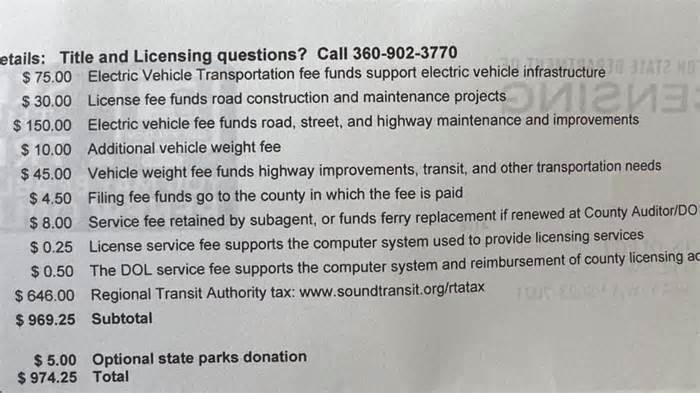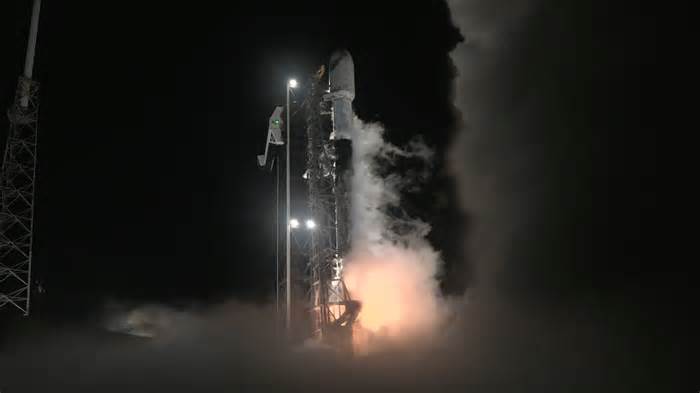
My Tesla Model Y Fees Are Outrageous In Washington State, And That 's Why I'm Selling It This Year
- by Torque News
- Jun 28, 2025
- 0 Comments
- 0 Likes Flag 0 Of 5

Advertising
Owning a Tesla is supposed to be the gateway to a simpler, more cost-efficient driving experience. For many, it still is. But in some corners of the country, that promise seems to be slowly unraveling under the weight of fees and taxes. That became clear this afternoon when I came across a post from Alek Ivanovich in the Tesla Model Y Facebook group that caught my attention.
His post speaks for itself: “This is insane if you ask me, but $1,000 for tabs? Selling my Model Y this year.”
When Incentives Turn into Penalties
What Alek experienced isn’t rare. EV owners across Washington have been hit by high fees that seem to stack year after year. And while there’s truth to the fact that these taxes apply to gas cars too, the perceived value imbalance is what stings.
Don G. Davis chimed in with a practical reminder: “You will still have to pay the $646, even if you have a gas car.”
He’s right about that. The RTA tax is assessed based on vehicle value and applies regardless of the fuel type. But the issue for many Model Y owners is that electric vehicles depreciate slower on paper, meaning the tax often stays high longer than expected. Combine that with the lack of traditional fuel costs, and the psychological sticker shock becomes even worse when a single annual bill rivals months’ worth of gas. Some owners are beginning to wonder whether the long-term economics of ownership are still holding up, especially after experiencing surprisingly early battery degradation on Model Y vehicles with low mileage.
Scott Helmann tried to make sense of the math: “It all depends if you save $225 a year driving electric rather than a gas vehicle. EVs pay no road tax through buying gasoline (gas tax), so this is how they get money to maintain the roads.”
This also makes some sense. State governments have had to pivot since EV drivers don’t pay gas tax, so revenue to fund infrastructure has to come from somewhere else. But the question becomes whether it's being implemented fairly, transparently, or in a way that EV drivers actually understand. This has led some buyers to hesitate when comparing the benefits of leasing new versus buying used, especially after seeing how used Model Y prices are affecting new lease decisions.
Steven Michael, clearly fed up, offered this blunt assessment: “I think I’d find a better state to move to (won’t have to look hard).”
That sentiment echoes what many have been quietly thinking. It reminds me of a story where a Tesla owner shared how a seemingly minor issue like a broken camera led to a shocking $3,300 repair bill, which made them question if their next car should even be a Tesla. It’s not just about the tax; it’s about the feeling that policy is penalizing early adopters. Especially in states that once waved EV incentives like candy to pull people in.
An Overlooked Flaw in the Tax System
Advertising
An overlooked piece of the puzzle is how the RTA tax is calculated in the first place. It’s based on the manufacturer’s suggested retail price (MSRP) and a government formula that doesn’t always reflect real-world depreciation. This hits electric vehicles especially hard because their resale values often stay high, or at least appear to in tax formulas, even if actual market values have softened.
For example, while used Model Ys may be sitting on dealer lots longer or seeing price cuts, the valuation tables still treat them like hot commodities. That disconnect means some EV owners are paying taxes as if their cars were worth more than they could reasonably sell them for. It’s a frustrating irony: owning a vehicle that’s losing appeal in the resale market but gaining in annual tax liability.
My Reflection on This Matter
I think this situation reflects the boiling point of what happens when real-world ownership starts diverging from the promise of the brand. For years, Tesla captured imaginations by offering cutting-edge tech, sleek design, and the idea that you could outsmart the gas pump. But when real costs like a $1,000 registration sneak in, or when service quotes rival luxury imports, that dream starts to feel less grounded. One owner even shared how switching from a Toyota Tundra to a Model 3 gave them a fresh appreciation for Tesla’s innovation, which shows how powerful the brand story can still be when expectations are met, especially for first-time EV drivers who want to understand the hype.
In Alek’s case, it wasn’t one issue, but rather a slow drip. High taxes, uncertain resale value, concerns about long-term reliability are all playing a piece. So now that drip has turned into a decision to walk away. This could be a major wake-up call and not just for Tesla, but for policymakers and other EV brands hoping to earn long-term loyalty in the EV world.
Key Takeaways for EV Owners
EV fees are rising in many states. Don’t assume that owning an electric vehicle automatically means you’ll save on annual costs. Registration fees, special EV taxes, and reduced depreciation can lead to surprisingly high bills.
State policies can make or break your EV ownership experience. As we saw from Washington State’s RTA tax, location matters. Where you live may dramatically alter the affordability of your electric vehicle.
Consider the long-term maintenance and service realities. Beyond fuel savings, EV owners should be ready for the cost of repairs post-warranty. Tesla, in particular, has seen criticism for unpredictable service costs.
Ownership isn’t just about specs, it’s about the full experience. Whether it’s a tax bill, a service center visit, or battery degradation, these pain points can build up over time and shape the bigger decision: do you stick with the brand, or move on?
So What Are Your Thoughts?
What do you think of these fees? Are they getting too crazy in certain states in your opinion?
And have any of you experienced unexpected fees or taxes that made you question your ownership? EV or not?
I'd love to hear your thoughts on this, so don't hesitate to join the conversation in the comments below.
Aram Krajekian is a young automotive journalist bringing a fresh perspective to his coverage of the evolving automotive landscape. Follow Aram on X and LinkedIn for daily news coverage about cars.
Image Sources: The “Tesla Model Y” public Facebook group and Tesla’s gallery.
Please first to comment
Related Post
Stay Connected
Tweets by elonmuskTo get the latest tweets please make sure you are logged in on X on this browser.






 Energy
Energy

















